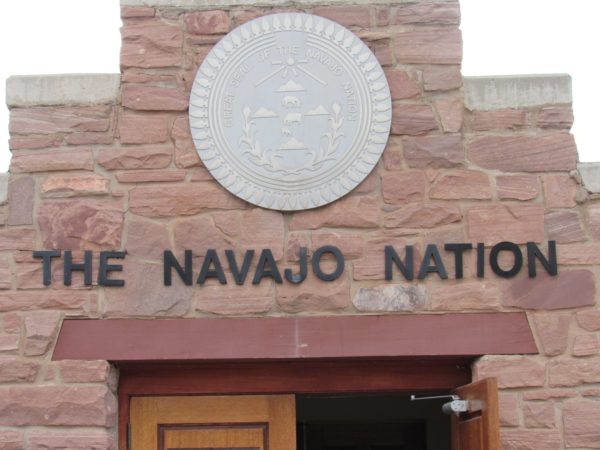
- Details
- By Levi Rickert
WINDOW ROCK, Ariz. — On Friday, the Navajo Department of Health, in coordination with the Navajo Epidemiology Center and the Navajo Area Indian Health Service, reported 56 new COVID-19 positive cases for the Navajo Nation and 10 more deaths. The total number of deaths has reached 396 as of Friday.
Reports from all 12 health care facilities on and near the Navajo Nation indicate that approximately 5,781 individuals have recovered from COVID-19. 62,665 people have been tested for COVID-19. The total number of COVID-19 positive cases for the Navajo Nation is 8,098.
Navajo Nation COVID-19 positive cases by Service Unit:
- Chinle Service Unit: 2,023
- Crownpoint Service Unit: 698
- Ft. Defiance Service Unit: 513
- Gallup Service Unit: 1,344
- Kayenta Service Unit: 1,150
- Shiprock Service Unit: 1,299
- Tuba City Service Unit: 741
- Winslow Service Unit: 326
* Four residences with COVID-19 positive cases are not specific enough to place them accurately in a Service Unit.
The Navajo Nation’s 57-hour weekend lockdown began on Friday, July 10 at 8:00 p.m. until Monday, July 13 at 5:00 a.m. All businesses on the Navajo Nation are also required to close for the lockdown to help prevent travel among residents and visitors.
"The Navajo Nation has over 200 police officers to cover over 27,000 square-miles, so we need to hold ourselves and our family members accountable for complying with the 57-hour weekend lockdown. COVID-19 is a very serious health issue. The number of COVID-19 cases on the Navajo Nation is flattening, but areas around our Nation are increasing so you’re putting yourself and your family at risk if you choose to leave during the weekend lockdown. We’ll see the results of the Fourth of July weekend in the coming days. We have too many of our own Navajo people in hospitals, in ICU’s, and on ventilators fighting for their lives. We don’t want any more of our people to contract the coronavirus and that’s why we implement safety measures requiring masks to be worn in public, daily curfews, and the weekend lockdowns. When we stay home, we isolate the virus and we help to save lives," President Nez said on Friday.
The Navajo Nation’s Stay at Home Order remains in effect requiring all individuals on the Navajo Nation to stay at home and strictly limit movement, and limit public contact with others. Individuals may leave their place of residence only for emergencies or to perform "Essential Activities.” All residents are also required to avoid close contact with people who are sick, wash your hands for 20 seconds often, avoid touching high-touch surfaces, wear a mask, clean and disinfect your home, avoid public gatherings, and avoid non-essential travel.
|
To Donate to the Navajo Nation The official webpage for donations to the Navajo Nation, which has further details on how to support the Nation’s Dikos Ntsaaígíí-19 (COVID-19) efforts is: http://www.nndoh.org/donate.html. For More Information For more information including reports, helpful prevention tips, and more resources, please visit the Navajo Department of Health’s COVID-19 website. To contact the main Navajo Health Command Operations Center, please call (928) 871-7014. For up to date information on impact the coronavirus pandemic is having in the United States and around the world, visit the Worldometers website. For up-to-date information about COVID-19, Native News Online encourages you to go to Indian Health Service’s COVID-19 webpage. |
More Stories Like This
Native News Weekly (August 25, 2024): D.C. BriefsNavajo Nation Mourns the Passing of Former Vice President Rex Lee Jim
Deb Haaland Earns Endorsement From Communications Workers of America Local 7076
University Soccer Standout Leads by Example
Two Native Americans Named to Democratic Congressional Campaign Committee's“Red to Blue” Program
Help us defend tribal sovereignty.
At Native News Online, our mission is rooted in telling the stories that strengthen sovereignty and uplift Indigenous voices — not just at year’s end, but every single day.
Because of your generosity last year, we were able to keep our reporters on the ground in tribal communities, at national gatherings and in the halls of Congress — covering the issues that matter most to Indian Country: sovereignty, culture, education, health and economic opportunity.
That support sustained us through a tough year in 2025. Now, as we look to the year ahead, we need your help right now to ensure warrior journalism remains strong — reporting that defends tribal sovereignty, amplifies Native truth, and holds power accountable.
 The stakes couldn't be higher. Your support keeps Native voices heard, Native stories told and Native sovereignty defended.
The stakes couldn't be higher. Your support keeps Native voices heard, Native stories told and Native sovereignty defended.
Stand with Warrior Journalism today.
Levi Rickert (Potawatomi), Editor & Publisher

